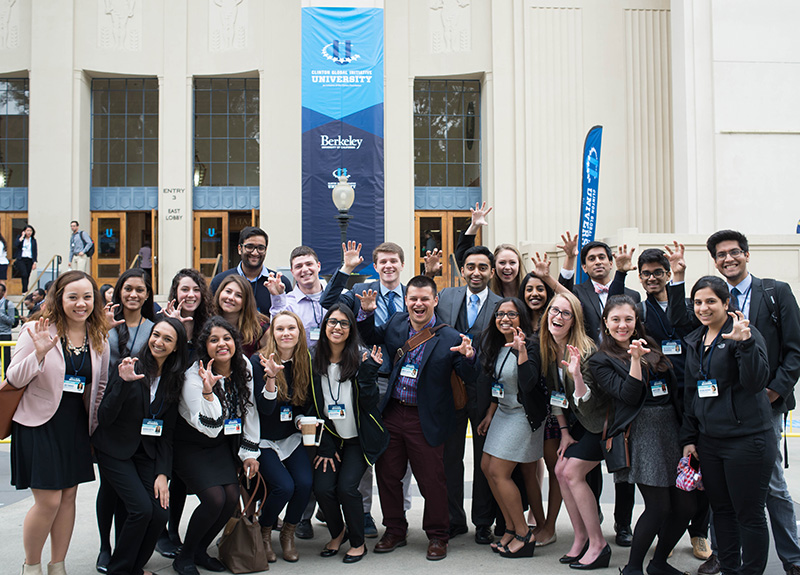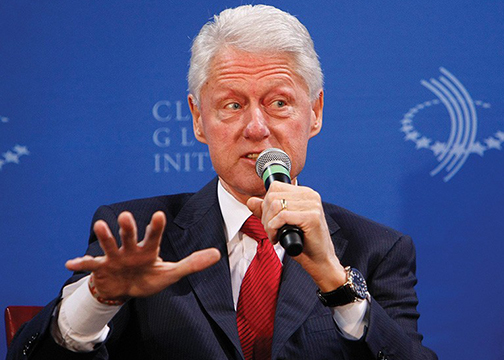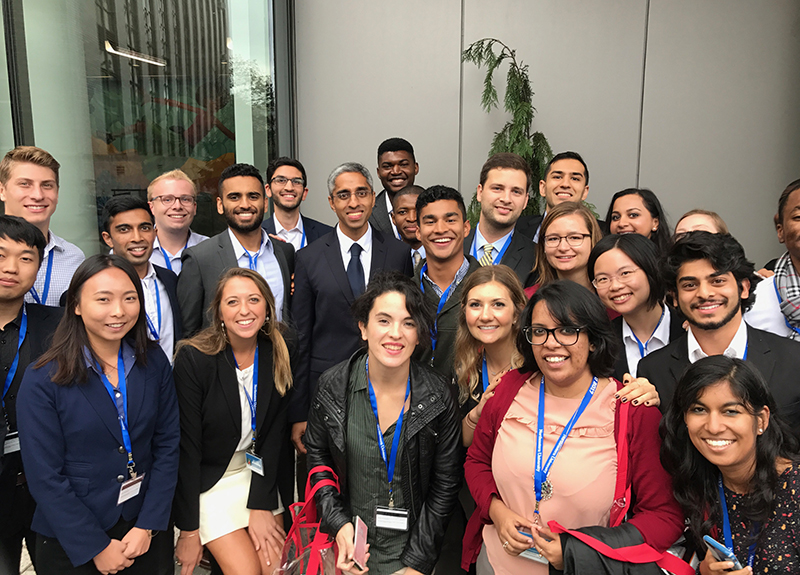In April, 26 Northwestern students attended the 9th annual Clinton Global Initiative University (CGI U) meeting at the University of California, Berkeley. The event brought together world-renowned leaders, celebrity speakers, and students from around the globe to discuss effective solutions to some of the world’s most pressing challenges.
Founded by President Bill Clinton in 2007, CGI U networks the innovation talents of students from more than 300 universities across the globe to foster student-led actions that address sustainability issues impacting their communities and the world.
Since 2014, the Institute for Sustainability and Energy at Northwestern (ISEN) has served as the University’s liaison to the CGI U network, working closely with student teams to submit impactful proposals that address sustainability issues in their communities and the world. Project proposals typically fall in the categories of education, the environment and climate change, peace and human rights, poverty alleviation, and public health.
This year’s Northwestern cohort included students from 18 majors and minors at the University and several prominent student organizations on campus. Two students from Northwestern’s Community Health Corps secured $3,000 in Commitment funding through an on-site pitch competition sponsored by the Resolution Social Venture Project (RSVP). Odette Zero (WCAS ’17) and Udita Persaud (WCAS ’17) pitched their Evanston- and Skokie-based health resource hubs (HIRCULES Health Hubs), which work to shrink health resource gaps in the two surrounding communities. They were among 15 winners, out of 133 applicants to receive funding at the meeting.
“The RSVP funding will help us increase the impact of the Health Hubs in the Evanston and Skokie communities. The ultimate goal is to reduce health literacy barriers and improve access to care for Chicago-area residents,” said Persuad.
Since the meeting in April, CGI U has launched the $1 million CGI U Innovation Fund to source, support, and feature themost effective, high-impact student innovators and entrepreneurs from around the world. Awarded funds will range from $2,000 to $10,000 and accepted students will be invited to attend a CGI U meeting.
For a full list of this year’s teams and their Commitments please see below:
Victoria Yang, Psychology & Business ‘16
Marlan is a mental health web app that transforms how society views mental health and how individuals approach it. Gathering complex jargon from research into a simple, easy to use database that provides visual, comprehensible facts, Marlan also provides a personal tracking system that makes tracking personal emotions like stress, anger, and happiness easy. Feedback and trends are given back to the user so that they can easily understand their mental health.
Team: Nikita Patel, Computer Science ’17, Ankita Radakrishnan, Anthropology ’17, Hannah Beswick-Hale, Psychology ‘17
The objective of Empowering India’s Poverty Through Business Education is to establish a program that supports socioeconomically disadvantaged students from India in their pursuit of an MBA in the United States. This degree will allow these students to obtain leadership roles in their careers and better serve their communities. This initiative is a holistic support system that provides these students with full financial backing, logistical coordination through the application process, and a support structure while abroad. To make this Commitment sustainable, graduates of the scholarship program will be asked to financially back future scholars once they have a stable income.
Team: Piryanka Garigipati, Neuroscience ’17, Jessica Hoffen, Psychology ’17, Amanda Blazek, Journalism ‘17
Health Asset Mapping in Evanston and Skokie uses ArcGIS to create an interactive map of health resources for Evanston and Skokie residents. The Commitment will work within the structure of the Community Health Corps, a student group that serves as a bridge linking residents to local health resources. The group is in the process of mapping public health resources within Evanston and Skokie so residents can easily locate the resources, and accessible public transportation to those resources. The map, as well as a comprehensive database of the resources, will be available through HIRCULES Health Hub* and our community partners.
Team: Odette Zero, Anthropology ’17, Udita Persuad, Anthropology ’17, Emery Weinstein, Health Policy ‘16
Presented by members of Northwestern University’s Community Health Corps (CHC), the Health Hub seeks to reduce health literacy barriers and improve overall access to health care for Chicago-area residents. Specifically, it will identify, measure, and analyze health information gaps faced by the Evanston and Skokie communities. Data will be gathered by a network of more than 40 student volunteers serving CHC health desks (Health Hubs) at the Evanston and Skokie libraries. The team will analyze metrics and to improve access to care, as well as implement health services customized to diverse communities.
Team: Upasna Madhok, Computer Science ’18, Akshay Batra, Computer Science ’18, Wajihuddin Omar Mohammed, Mechanical Engineering ‘18
Code for Chicago aims to empower students from lower socio-economic backgrounds in the Chicagoland area and improve their computer literacy by encouraging critical thinking, creativity and college readiness through lessons in coding and developing. Moreover, this commitment hopes to inspire students and equip them with the necessary technical and professional skills to pursue higher education in STEM-related fields.
Brian Cheng, Economics ‘17
Smokeless Stoves in Guangdong, China will address the indoor air pollution and respiratory disease issues. Having previously lived in nearby Hong Kong, Brian hopes to use his familiarity with the customs and practices of the region to conduct ethnographic research into the continued use of traditional stoves that produce excess smoke. Brian also plans to connect with Guangdong Jiewang Electric Science Company, a partner in the United Nations Global Alliance for Clean Cookstoves, to distribute smokeless stoves to address this problem.
Lakshmi Karuparthy, Film ‘17
Fired Up From the Fever Malaria Project aims to apply the marriage of medicine and media through the production of two documentaries about malaria, a disease that has eluded humanity for over 500,000 years. One of the documentaries will showcase the hardships found in the tribal village of Rampachodavarm that prevent successful malaria eradication, and the second film will highlight in the Telugu language information about the disease and preventive measures for the tribal villages to implement.
Team: Drew D'Alelio, Political Science, ’16, Bradley McCandless, Political Science ’16, Macray Poidomani, Economics ‘17
In More than a Nuclear Deal: The U.S. and Iran, American and Iranian students will participate in an educational exchange program, taking place in Chicago and Tehran. This eight-week summer program will include learning opportunities inside and outside of the classroom with the goal of engaging American and Iranian students on social, political, and cultural topics relevant to both societies.
Team: Praneet Polineni, ’19 and Matt Shinego, ‘19
Urban Orchards will address poor nutrition in identified food deserts within Duval County of Jacksonville, FL. To achieve this goal, Urban Orchards will work with student volunteers from Stanton College Preparatory and A. Phillip Randolph, local high schools near our selected census tract, to plant fruit-bearing trees and bushes in household yards. Additionally, Urban Orchards will collaborate with Habitat for Humanity Jacksonville (HabiJax) to plant at existing and planned Habitat homes.
Hannah Marie Ryon, Environmental Science, Environmental Policy and Culture ‘17
The Unoidid Mussel Filtration Project addresses the excessive contamination in the Chicago River, one of the nation’s most threatened waterways. This self-sustaining and proven method of filtration using bivalves will be tested on an isolated portion of the river and then expanded to impact areas of higher pollution.
Team: Arianna Kathryn Farmer, Social Policy, Global Health ’17, Andrea Zuleta, Political Science ‘17, Rishika Bheem, Economics ‘18
This commitment will work towards increasing UNICEF campus initiatives in the Chicago-land area to bolster collaboration efforts and fundraising in the Midwest. Through June of 2016, Arianna, Andrea, and Rishika will work to reach out to faculty and students at college campuses to spark interest in creating a campus initiative and going through the necessary steps of creating a constitution and registering with the university. During the 2016-2017 school year, Arianna, Andrea and Rishika will then act as a resource for these newly established clubs during their first year of programming.
Archit Baskaran, Political Science ‘17
Archit will examine LGBT/Sexual Minorities Cultural Competency in two different types of settings: 1) The Healthcare Delivery system. 2) The external support/counseling system. By studying how organizations spanning different cultures integrate LGBT/sexual minorities-affirming environments into their cultural competence frameworks, he will distinguish best practice models and propose ways in which the US and other societies can scale up hospice care to make it accessible for LGBT/sexual minorities.
Team: Kanika Gupta, Biology ’16, Milaap Mehta, Chemical Engineering ’17, Pooja Chopra, Biomedicine ‘18
In 2015, Kanika Gupta committed to developing a system for girls and women in Charnia, India to distribute and sell sanitary pads to create employment and improve hygiene for women. Kanika works with Project RISHI Northwestern, an organization that operates a primary health clinic in Charnia with a local non-profit, providing access to basic healthcare for 10000 people. The team is now looking to use this health clinic and contacts with local women to distribute sanitary pads. In the first year, this project aims to provide sanitary pads regularly for 300 women and to create employment for 10 women.
Katie McLaughlin, Biology ‘16
Katie McLaughlin commits to creating The Village, a mentorship-centered, community-based organization intended to serve the children of parents incarcerated or recently released from Cook County Jail and to exonerate these children from the consequences of the actions of the most important adults in their lives. Furthermore, The Village aims to increase awareness and understanding of and reduce stigma surrounding the issues faced by children of prisoners. The ultimate goal of The Village is to alleviate the effects of mass incarceration on the nation’s youth and to break the cycle of intergenerational incarceration in the United States.





